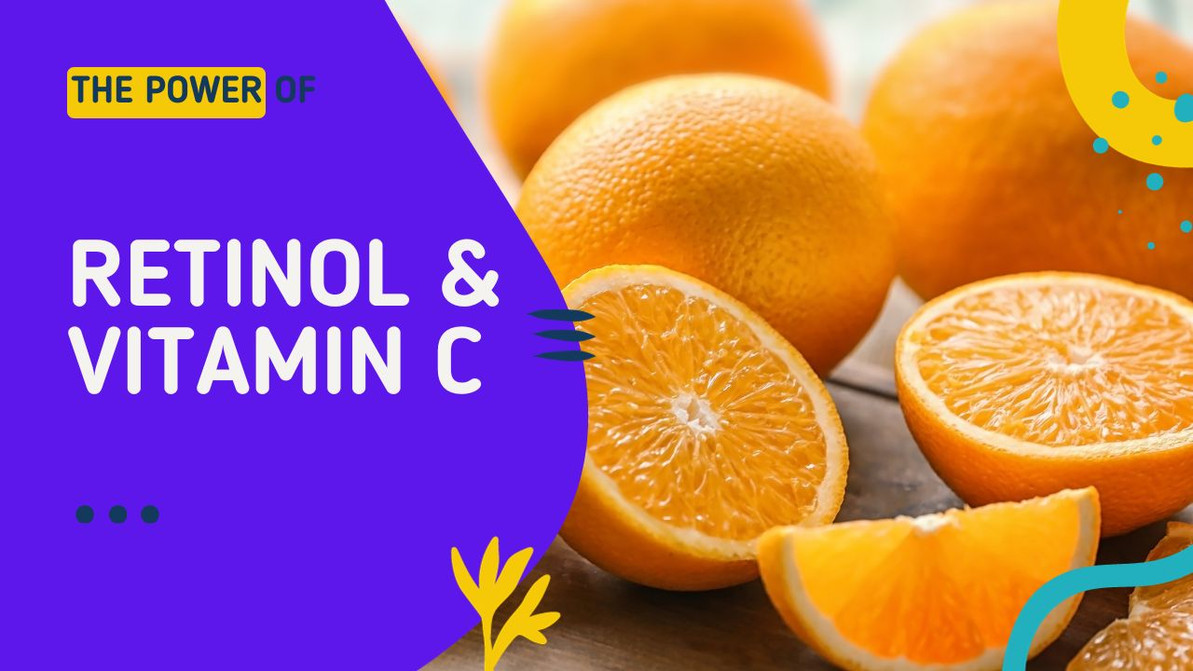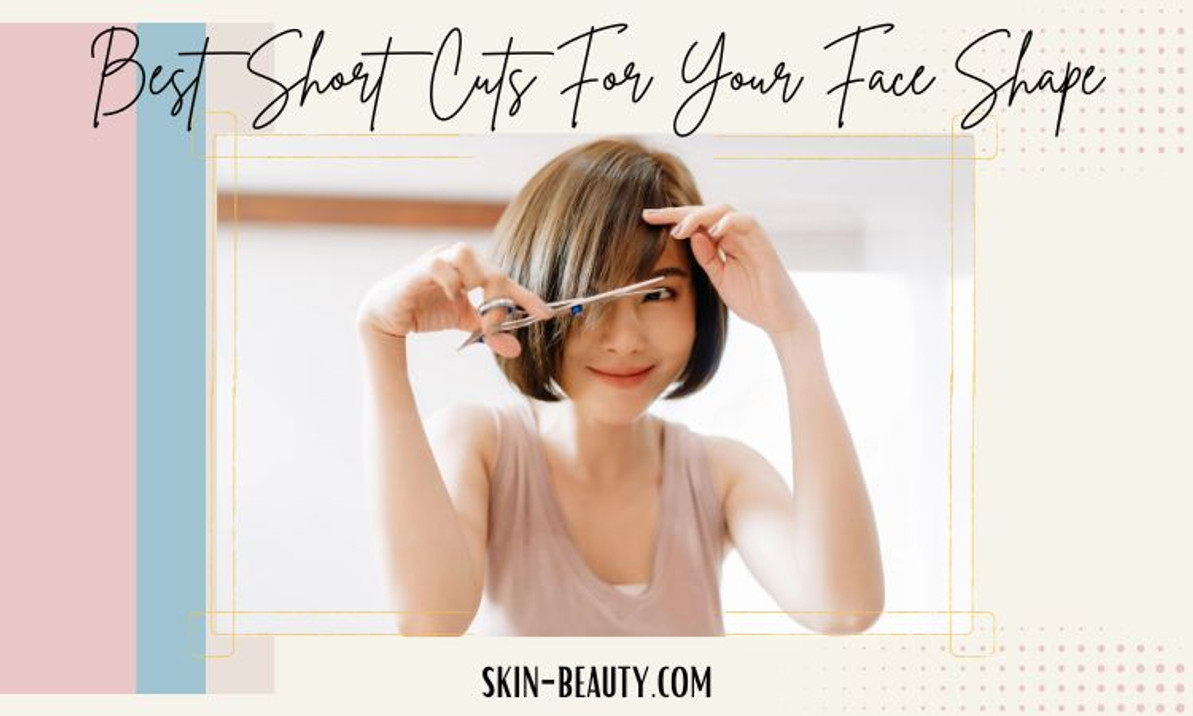Retinol and Vitamin C
The Power of Retinol and Vitamin C: Unlocking The Secrets to Youthful Skin
Dreaming of that youthful, radiant complexion? The secret lies in the powerful combination of retinol and vitamin C – two key ingredients that work together to unlock the door to smooth, vibrant, and younger-looking skin. Let’s embark on a journey to discover the incredible benefits of these skincare superstars and how they can transform your skin for the better.
Key Takeaways
- Retinol and Vitamin C are key players in skincare that can help improve skin texture, tone, reduce fine lines & lighten dark spots for a youthful complexion.
- Combining Retinol and Vitamin C creates an effective synergy to enhance results with combined antioxidant effects & anti-aging properties.
- Proper product selection & layering techniques along with additional skincare ingredients maximize the benefits of retinol and vitamin C for healthier skin.
Understanding Retinol and Vitamin C: Key Players in Skincare
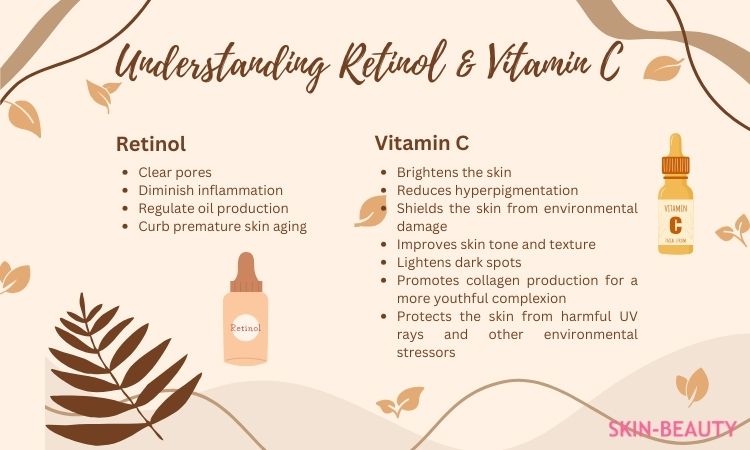
Navigating the skincare industry can be challenging due to the vast array of products and ingredients promising miraculous results. However, two significant game-changers in effective skincare are retinol and vitamin C. These powerful active ingredients have a myriad of benefits for skin health, including:
- Improving skin texture and tone
- Reducing fine lines
- Lightening dark spots
- Brightening dull skin
Integrating retinol and vitamin C into your daily skincare routine paves the way for a more youthful and glowing complexion.
Retinol: The Anti-Aging Powerhouse
Retinol, a derivative of vitamin A, is a potent anti-aging ingredient that works its magic by promoting cell turnover, stimulating collagen production, and improving skin tone and texture. This powerful skincare ingredient penetrates deep into the skin and can even reach the dermis layer, where it affects skin cells, making it effective in reducing the appearance of wrinkles, fine lines, and dark spots.
Retinol is recognized for its capacity to:
- Clear pores
- Diminish inflammation
- Regulate oil production
- Curb premature skin aging
However, although retinol offers incredible benefits, it’s important to consult your dermatologist for the right product recommendations, as some forms of retinol, like tretinoin, are only available through prescription.
Vitamin C: The Skin Brightener and Protector
Vitamin C, a powerful antioxidant, offers several benefits for brighter skin:
- Brightens the skin
- Reduces hyperpigmentation
- Shields the skin from environmental damage
- Improves skin tone and texture
- Lightens dark spots
- Promotes collagen production for a more youthful complexion
- Protects the skin from harmful UV rays and other environmental stressors
When selecting a vitamin C product, look for the presence of L-ascorbic acid, formulated optimally at a pH of less than 4, in an opaque, air-restrictive bottle or pump container. A high-quality vitamin C serum is an excellent choice to ensure these criteria are met.
Combining Retinol and Vitamin C: A Dynamic Duo

Using retinol and vitamin C together can enhance their individual benefits and create a powerful skincare duo that maximizes the effects of both ingredients. Vitamin C optimizes the effectiveness of retinol, making it even more potent in reducing the signs of aging and environmental damage.
To achieve the best results, it’s crucial to use retinol and vitamin C at different times of the day, allowing each ingredient to work effectively without interfering with each other’s absorption.
Synergy for Enhanced Results
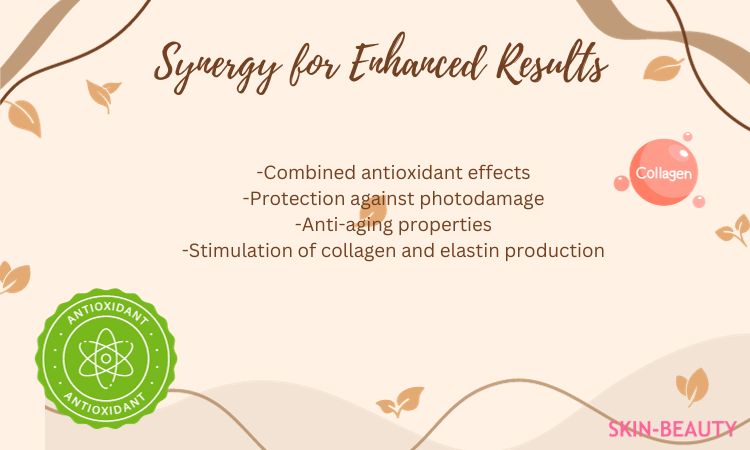
When used together, both retinol and both vitamin C work synergistically to improve skin health, reversing signs of aging and environmental damage. Retinol enhances the effects of vitamin C by stimulating collagen production, while vitamin C offers antioxidant protection and neutralizes free radicals.
Several scientific studies have revealed the powerful synergy of retinol and vitamin C for skin health. The combination of these two ingredients offers the following benefits:
- Combined antioxidant effects
- Protection against photodamage
- Anti-aging properties
- Stimulation of collagen and elastin production
Timing Matters: When to Apply Each Ingredient
Proper application timing is crucial for maximizing the benefits of retinol and vitamin C. Vitamin C should be used in the morning to help protect the skin from environmental stressors, while retinol should be used in the evening to restore the skin overnight. By applying retinol and vitamin C at different times, you can maximize their benefits and enjoy a more youthful and radiant complexion.
Be aware that simultaneous use of both ingredients may lead to irritation, thus applying them separately is advised for best results.
Addressing Skin Irritation and Sensitivity

While the benefits of retinol and vitamin C to skin health are impressive, the potential for skin irritation or sensitivity should be factored in when combining these potent ingredients. To minimize the risk of irritation, it’s crucial to introduce one ingredient at a time and alternate their use every other night.
Wearing sunscreen is essential when using retinol and vitamin C, as retinol thins the skin barrier, making it more sensitive to the sun’s UV rays, and vitamin C’s antioxidant properties support a healthy skin barrier, protecting the skin from UV damage.
Starting Slowly and Gradually Increasing Usage
To mitigate irritation and sensitivity for those with sensitive skin, begin with a lower concentration of each ingredient, progressively increasing usage. Introduce retinol into your evening skincare routine and vitamin C into your morning skincare routine a few weeks later. For beginners, dermatologists recommend a retinol concentration of 0.25 percent to one percent to achieve visible results.
Gradually increase the frequency of retinol use, starting with once or twice a week for the first month, and as your skin adjusts, increase the frequency based on your skin’s response.
Choosing the Right Products for Your Skin Type
Choose products that are suitable for your skin type and formulated to minimize irritation. Different skin types have unique characteristics and can benefit from retinol and vitamin C in various ways. For oily skin, opt for a lightweight, oil-free vitamin C formula with a higher percentage of L-ascorbic acid for maximum absorption. For combination skin, select products that can be adjusted based on individual needs, such as Tree of Life Vitamin C Brightening Serum and Retinol Firming Serum or Paula’s Choice Clinical 1% Retinol Treatment.
Expert Tips for Maximizing the Benefits of Retinol and Vitamin C
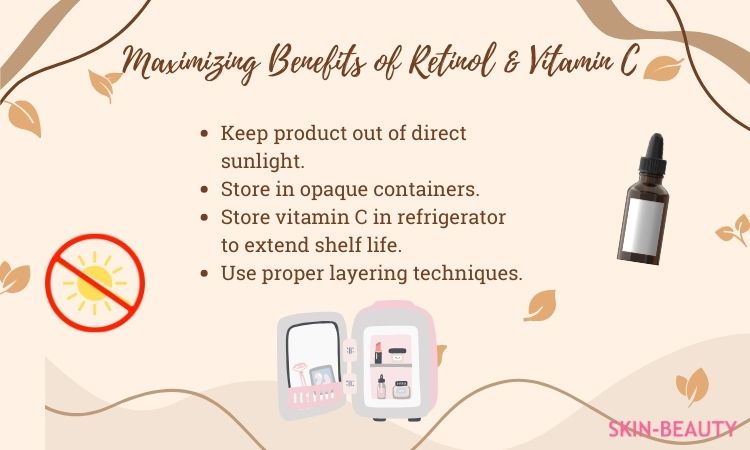
To fully exploit the benefits of retinol and vitamin C, adhere to expert advice and strategies:
- Store products in opaque containers
- Choose reputable brands for optimal performance and stability
- Properly layer retinol and vitamin C with other skincare products to allow active ingredients to absorb deeper into the skin, increasing their effectiveness.
Proper Storage and Product Selection
Keep retinol and vitamin C skincare items in dry areas with stable temperatures for the best results. Keep them away from direct sunlight and heat to ensure their efficacy. Some experts suggest storing vitamin C products in the refrigerator to maximize their shelf life.
When selecting retinol and vitamin C products to address acne scars, opt for reputable brands such as Eau Thermale Avène, Lancer Skincare, Olay, Neutrogena, RoC, and CeraVe.
Layering Techniques and Additional Skincare Ingredients
Learn proper layering techniques and incorporate additional skincare ingredients to enhance the effects of retinol and vitamin C. Here are some tips to follow:
- Layer products from thin to thick consistencies.
- Apply the highest percentage of actives first.
- Avoid using retinol and vitamin C together, as they have different pH requirements and may cause irritation.
- Give new products at least three months before changing your skincare regimen to see optimal benefits.
Hyaluronic acid, peptides, and antioxidants can help amplify the effects of retinol and vitamin C, keeping skin hydrated, boosting collagen production, and protecting from environmental damage.
Real-Life Success Stories: Retinol and Vitamin C Transformations
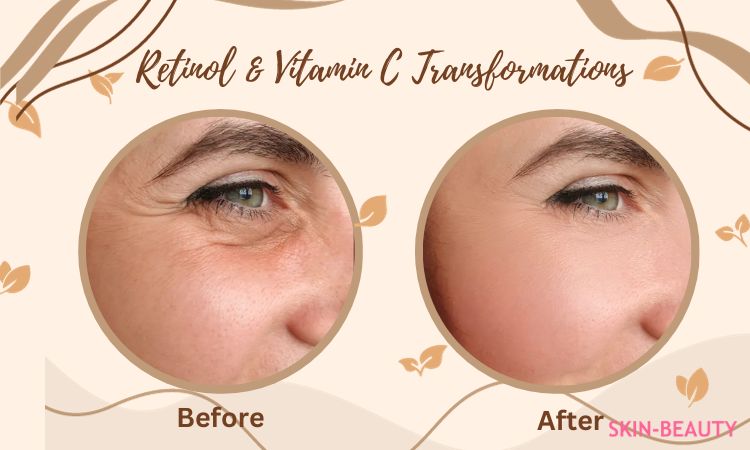
Numerous real-life success narratives highlight the astounding skin transformations of individuals who used retinol and vitamin C in combination. These inspiring stories, found on websites like Cosmopolitan, Hot and Flashy, and Perfect Face La Jolla, highlight the incredible results of combining these two powerhouse ingredients in a skincare routine. Witnessing the before and after photos of people experiencing smoother, brighter, and more youthful skin is truly inspiring and motivates others to incorporate retinol and vitamin C into their own skincare regimens.
Summary
In conclusion, retinol and vitamin C are the ultimate skincare duo, offering a multitude of benefits for a youthful and radiant complexion. By understanding their unique properties, combining them effectively, addressing skin irritation and sensitivity, and following expert tips, you can unlock the secrets to vibrant and glowing skin. So, why wait? Begin your journey to a more youthful and radiant complexion today!
Frequently Asked Questions
Can I use retinol and vitamin C together?
Yes, you can use vitamin C and retinol together in your skincare routine! When combined, they can help to achieve glowing, healthy-looking skin while reducing signs of aging. It's best not to apply them at the same time as this may irritate your skin.
What not to mix with vitamin C retinol?
It's important to avoid combining vitamin C with retinol, benzoyl peroxide and AHAs/BHAs as the combination can be too harsh for the skin and lead to further irritation. Instead, keep them separate in your skincare routine.
Should I use vitamin C or retinol first dermatologist?
For best results, it's recommended to start with vitamin C and proceed to retinol for the best results. As retinol can make your skin more sensitive to UV light, it's best used overnight.
Is retinol or vitamin C better for anti-aging?
Overall, vitamin C is great for brightening and improving hyperpigmentation, while retinol is best for improving skin's elasticity and minimizing the look of fine lines. Ultimately, it depends on what you're looking to achieve with your anti-aging routine.
How do retinol and vitamin C work together?
Retinol and vitamin C work together to fight the signs of aging and environmental damage, boosting collagen production and offering antioxidant protection.
Recent Posts
-
Best Short Haircuts for Your Face Shape
The Best Short Haircuts for Your Face Shape Finding the perfect short haircut for every face can b …May 2nd 2024 -
Peptides For Skin: Exploring the Anti-Aging Benefits of Peptides in Skincare
Exploring the Anti-Aging Benefits of Peptides in Skincare In the universe of advanced skincare, th …Apr 25th 2024 -
Discover the Perfect Glasses & Styles to Enhance Your Rectangle Face Shape!
Your face shape plays a significant role in determining the most flattering hairstyles and makeup te …Apr 17th 2024

